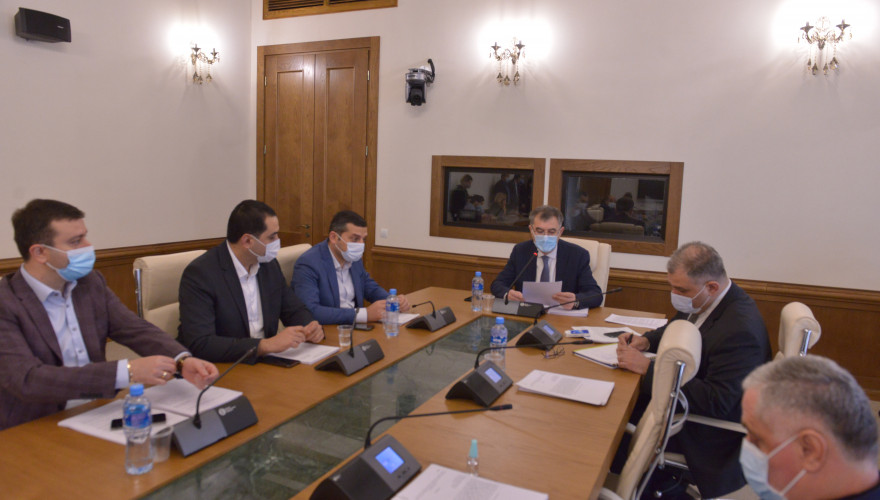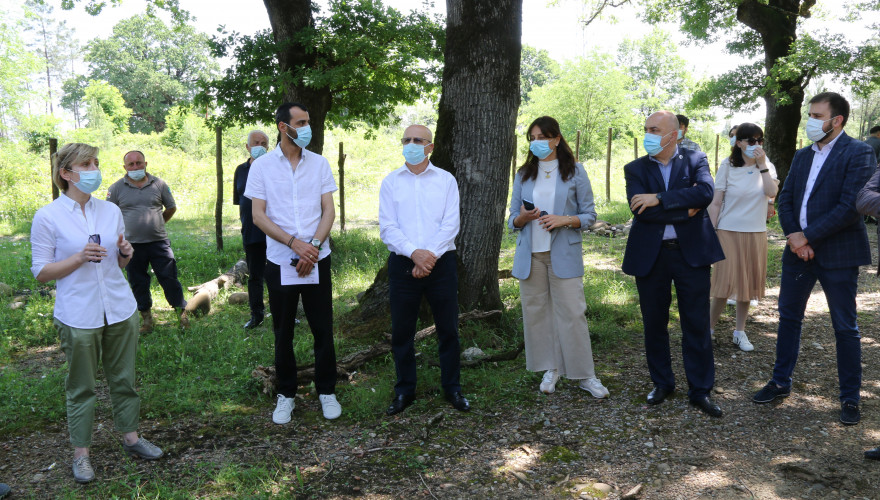The joint sitting of the Human Rights and Civil Integration and the Regional Policy and Self-Government Committees

The Committees discussed the Bill on Wind Break (Shelter) Belt, and the deriving Bills introduced by one of the initiators, Chair of the Agrarian Issues Committee, Nino Tsilosani.
Georgia encounters an acute problem of the maintenance, protection and legal status of the windbreak belts. In view of preventing the desertification process against global climate change, the restoration and maintenance of the practically destructed windbreak belts on the agricultural land plots and adjacent to the settled areas are of utmost importance in terms of the increased yearning and creation of an eco-friendly and healthy environment for the population.
“The Bill creates the basis: to determine the state policy on windbreak belts, to establish the legal relations on restoration, maintenance and protection of the windbreak belts”, - the reporter noted.
Within the Agriculture Modernization, Market Access and Resilience (AMMAR) Project, the Regional Environmental Center for the Caucasus (REC Caucasus), in February 2019 has developed the Regulation Impact Assessment (RIA) Report on the Bill on Wind Break (Shelter) Belt. As a result, a series of changes have been introduced to the Bill, though the information in the report is used in the expected outcomes of the Bill, as well as in the experience overview of other countries and the financial substantiation of the Bill.
The reporter answered the questions.
According to the Chair of the Regional Committee, Sozar Subari, the Bill is very important and necessary.
According to the Chair of the Human Rights Committee, Mikheil Sarjveladze, the Committee will reflect the editorial recommendations in its conclusion.
The Committees approved the Bill and the Human Rights Committee discussed the Bill on Criminal Code of Practice. The change aims at the simplification of the communication with the witnesses and the aggrieved parties in the criminal process, mitigation of the stress inflicted thereto, and prevention of the repeated victimization.
The Bill was introduced by the Deputy Interior Minister, Alexander Darakhvelidze.
According to him, in 2011, the Witness and Aggrieved Party Coordination Service has been set up in the prosecutor’s system. Under the current law, the investigator is not entitled to engage the coordinator of the witness and the aggrieved party in the criminal process. “Against the conditions when the Coordinator Service is established in the Interior Ministry as well, the decision-making on the engagement of the coordinator by the prosecutor solely is not effective. In view of the operative response, we need to grant the investigator this authority at the investigation stage”, - he stated.
The Bill will grant the authority to the investigator to engage the coordinator in the criminal proceedings. At that, the engagement of the coordinator shall be possible at any stage of legal proceedings. Despite that the Coordinator Service currently operates only in the Interior Ministry and the Prosecutor’s Office, the investigative bodies will enjoy the opportunity to, similar to the applicable regulations, appeal to the prosecutor for the engagement of the coordinator. Hence, the Bill does not impose the obligation of the set-up of a new service on the investigative bodies.
MPs expressed their positions and asked the questions. According to the Chair, 14 existing coordinators are not enough. First of all, the increase of the number of coordinators will create opportunities in terms of the regional coverage and will increase the operative activity, efficiency and quality.
“It is important to enhance the institution of the coordinator of the witness and the aggrieved party and this process shall be facilitated. It is considered that it is one of the improvements in the criminal proceedings in the term that the coordinators play important role in many, sensitive crimes in ensuring a high standard of the legal status of the victim and the witness (which often can be one and the same person). In recent years, it has been enhanced by the legal changes in case of the Prosecutor’s Office, and it is quite logical and consistent to do the same in case of the Interior Ministry”, - M. Sarjveladze noted.
The Committee approved the Bill.





